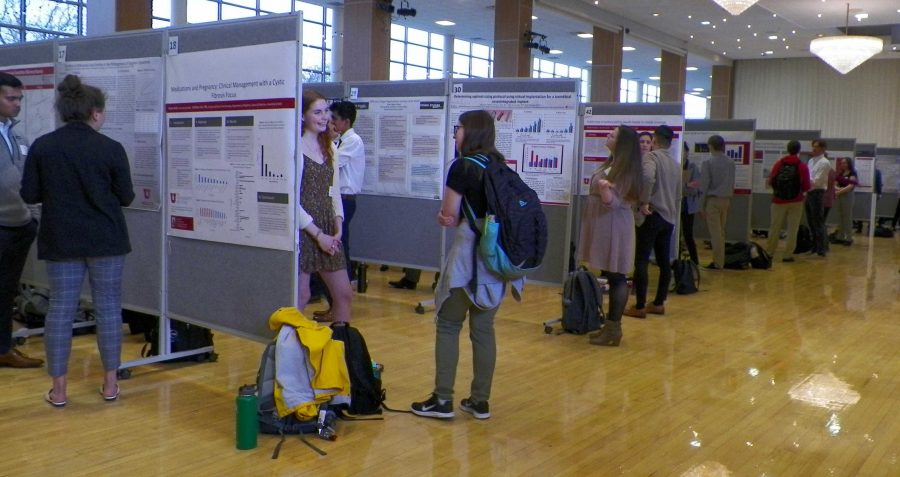“Second place and $10,000 goes to…” The presenter paused, allowing the tension to build. A whopping 153 student businesses had applied for the 2019 Utah Entrepreneur Challenge, and the top 20 teams were gathered in Lassonde Studio’s garage space for the final award ceremony. The presenter took a breath and shouted, “SHERO: Biodegradable Feminine Hygiene Products!” The room exploded with cheers as the team of three female engineers were welcomed onto the stage. They were beaming as they accepted their award, but for this team of innovators, this moment was more than a crystal trophy and an oversized check. It was validation for every email sent to potential mentors that went without reply, every late night spent in the lab determining the absorption properties of biodegradable materials like banana peels and every burn from the novel hot melt adhesive they created. It was a celebration of the hard — and sometimes frustrating — work that the team poured into this good idea to build it into a meaningful research project and a sustainable business model.
While it is easy to highlight SHERO due to their recent success, it is just one of the hundreds of research projects that undergraduate students at the University of Utah are pursuing. This semester, undergraduate researchers from departments like chemical engineering, dance and information systems have worked to prevent opioid overdoses, to increase diversity in ballet and to thwart human trafficking supply chains. Undergraduates at the U are able to produce quality, consequential research in part because of the resources the university allocates through the Office of Undergraduate Research to support and encourage those interested in participating in research.
Megan Shannahan, an undergraduate research advisor, thinks the largest obstacle students face in research occurs before they even begin in the lab. “Students often have trouble navigating the system of researchers to find an interested faculty advisor in their area of research,” Shannahan said. “Finding a mentor becomes especially difficult when the student is interested in doing research outside of their department.”
Understanding this roadblock to student participation in research at the U, OUR provides advising appointments with knowledgeable faculty like Shannahan to help interested students begin the process of searching for an advisor. Additionally, OUR has an online database to help students find current research positions in campus labs and provides resources to help students contact professors working on projects they are interested in.
Nationally, less than 30% of undergraduates are interested in taking advantage of research opportunities. Of the students who do not participate in undergraduate research, 21% cited the lack of paid opportunities as a significant obstacle to their participation. Wanting to make research more accessible, OUR created the Undergraduate Research Opportunities Program. UROP offers students who have found a faculty advisor and created a research plan a $1,200 stipend for a semester of research. Any full-time student at the U is eligible for this program and can apply for up to two semesters of funding. After the second semester, most successful student researchers are able to find funding through their mentor to continue their research.
For many students, an undergraduate research experience is their first foray into high-level, academic research. While faculty mentors often teach standard lab safety and experimental procedures specific to their lab, students are expected to know how to effectively present their lab findings. OUR is interested in developing students new to research into competent researchers.
To ensure that students develop into well-rounded researchers, OUR hosts the Undergraduate Research Educational Series — workshops that teach students skills such as how to create a professional research poster, how to speak confidently about their research and how to condense hundreds of hours of research into a couple hundred-word abstracts. URES also provides a networking setting where student researchers can discuss unexpected problems in their experimentation and fresh perspectives on the research challenges their peers are facing.
Amber Barron was a freshman in material science and engineering when she joined Dr. Jeffrey Bates’ team and began working on the project, which evolved into SHERO. Now a senior at the U, Barron believes her research experience has prepared her to be successful professionally. “Not only has my research connected me with global leaders in feminine hygiene products, a sector I am passionate about, I have developed skills in the lab, which can be applied to the development of other sustainable consumer products,” said Barron. As one of more than 500 students presenting at the Undergraduate Research Symposium this April, Barron is part of a cohort of U undergraduates who have addressed real-world problems and have enhanced their own educational experience through research. The impact of the effort made by OUR clearly shows through the excellent undergraduate research and researchers produced at the U.



